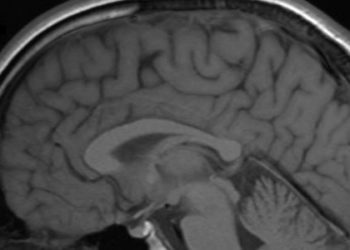Donanemab improved cognitive measures in early Alzheimer’s disease
1. Donanemab resulted in a modestly better composite score for cognition and the ability to perform activities of daily living in patients with early Alzheimer’s disease compared to placebo.
2. Treatment with donanemab resulted in amyloid-related imaging abnormalities.
Evidence Rating Level: 1 (Excellent)
Study Rundown: Buildup of amyloid-β (Aβ) peptide in amyloid plaques is found in early Alzheimer’s disease and leads to functional and cognitive impairment. Donanemab is an IgG1 antibody directed at an Aβ epitope present in established plaques. This trial evaluated the safety and efficacy of donanemab in patients with early Alzheimer’s disease. This trial found that donanemab resulted in a better composite score for cognition and performance in activities of daily living compared to placebo after 76 weeks in patients with early Alzheimer’s disease. However, the results for most secondary outcomes between the donanemab and placebo groups showed no substantial difference, including the Clinical Dementia Rating Scale-Sum of Boxes. Limitations included small sample size and the potential of survivor bias as there was a higher incidence of trial discontinuation in the donanemab group compared to the placebo group. Nonetheless, this study’s results are significant and showed donanemab can lead to a modestly less cognitive and functional decline compared to placebo.
Click to read the study in NEJM
Relevant Reading: Significant and sustained florbetapir f18 uptake reduction in patients with symptomatic Alzheimer’s disease with ly3002813, a β‐amyloid plaque‐specific antibody.
In-Depth [randomized controlled trial]: This double-blind randomized controlled trial enrolled 257 patients across 56 sites in the United States and Canada. The patients were randomized in a 1:1 ratio into either the donanemab group or the placebo group, respectively. Patients 60 to 85 years of age who had early symptomatic Alzheimer’s disease and had a Mini-Mental State Examination (MMSE) score of 20-28 were included in the study. Patients with a tau standardized uptake value ratio of more than 1.46 were excluded from the study. The primary outcome was a change in the Integrated Alzheimer’s Disease Rating Scale (iADRS) score from baseline to 76 weeks. A lower score indicated a greater cognitive deficit and greater impairment to perform activities of daily living. From baseline, the change in the iADRS score at 76 weeks was -6.86 in the donanemab group and -10.06 in the placebo group (difference, 3.20; 95% confidence interval [CI], 0.12 to 6.27; P=0.04). The change between both groups in the Clinical Dementia Rating Scale-Sum of Boxes score was -0.36 (95% CI, -0.83 to 0.12) and 0.64 (95% CI, -0.40 to 1.67) for the MMSE score. No significant difference in the incidence of death or serious adverse events between the two groups was found; however, the incidence of amyloid-related imaging abnormalities with edema or effusions was significantly higher in the donanemab group (26.7%) compared to placebo (0.8%). Altogether, this trial shows that in patients with early symptomatic Alzheimer’s disease, donanemab treatment resulted in less cognitive and functional decline, but resulted in amyloid-related imaging abnormalities.
Image: PD
©2021 2 Minute Medicine, Inc. All rights reserved. No works may be reproduced without expressed written consent from 2 Minute Medicine, Inc. Inquire about licensing here. No article should be construed as medical advice and is not intended as such by the authors or by 2 Minute Medicine, Inc.







